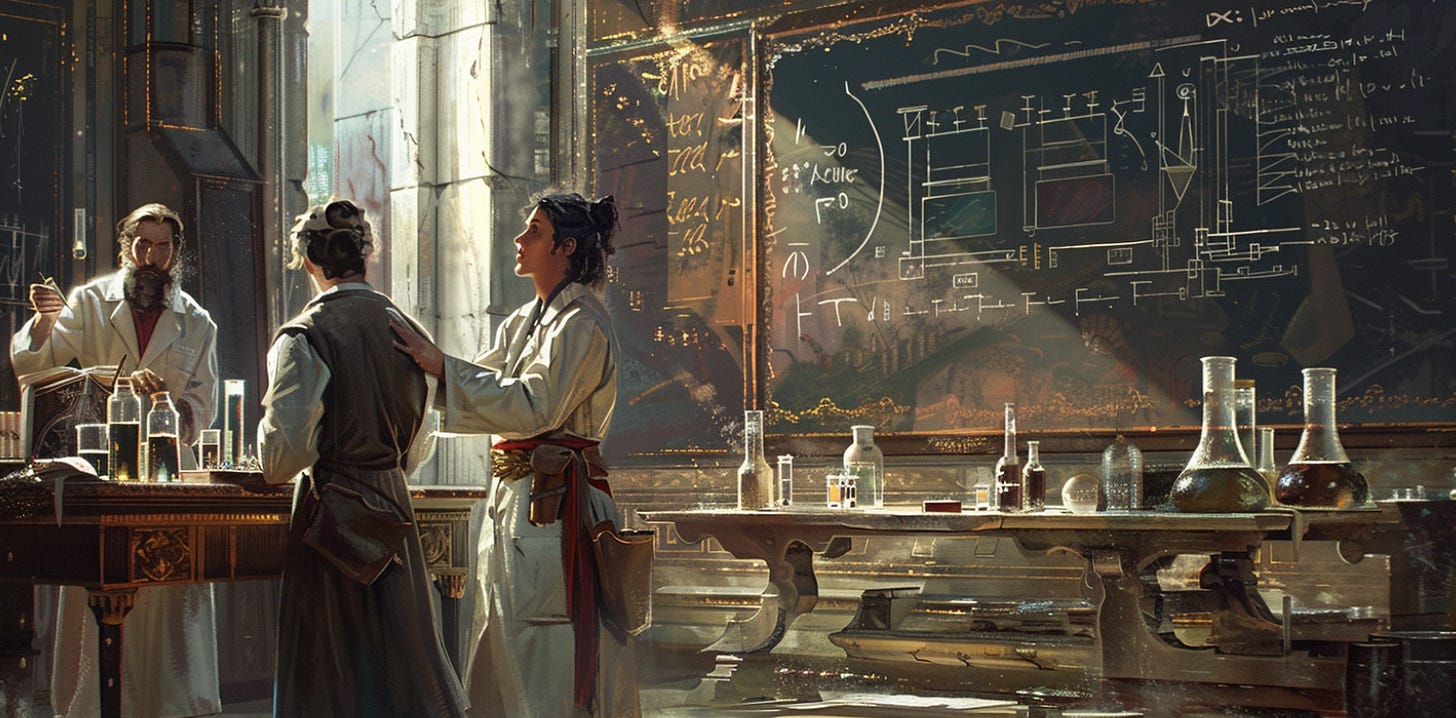Metamodern Politics: Transcending Ideologies
Six new forms of politics for bridging the divide and starting a revolution
After a slight delay of 1.5 years, I‘ve decided to finally dust off to finish & publish this post. If you missed the first part, you should go read it here.
These posts are based on part 1 & part 2 of the Hanzi Freinacht books on Political Metamodernism - The Listening Society & The Nordic Ideology.
In short, political metamodernism should help us transcend the left/right political divide to pragmatically build societies that work, rather than societies based on wishful ideologies of the 19th century.
Political metamodernism is freer than libertarianism, more egalitarian than socialism, more regenerative than ecologism, more prudent than conservatism and more rebellious than anarchism.
In this post
We’ll be talking about processes that target culture & development of everyone, about creating an existentially & emotionally mature society. To nurture a society where people feel like they belong & are supported in self-actualization.
We introduce six new forms of politics that are completely neglected by modern politics.
Doing so should lead us to less pollution, less destruction & less mindless consumption. At the same time - more independence & more connection.
In this post:
Problems
Six New Forms of Politics
Memetic Revolution
Towards a Sustainable Future
We go ahead with sincere irony, pragmatic idealism, informed naivety and magical realism, to entertain the potential of a relative utopia.
Problems
For most human history, child mortality and starvation were common. People were illiterate and even kings lived worse than an average person today.
For the most part, issues like people suffering from a lack of clean water, malnutrition & easily preventable diseases - have been resolved.
Alas! New problems emerged:
Global issues like ecological unsustainability
Extreme inequality
Alienation & lack of meaning leading to all kinds of crazy shit happening
To create a metamodern society, we must deal with residual problems of pre-modernity as well as the problems of modernity.
Emotions run the world
Avoidance of negative emotions makes up the invisible machinery that lets everyday life in any society run smoothly. If we were all free of shame or guilt when behaving immorally, society would descend into chaos.
Moreover, exclusion & rejection activate the same brain patterns as physical pain - pushing people to bitterness & vengefulness. Thing is, angry sad people make more people angry & sad. Happy people make more people happy.
In a sense, there’s an economy of emotions underlying all societies.
Since emotions are social, and freedom depends on emotions, freedom is social.
For freedom to be real, it must be felt & embodied.
“Society, in this view, is a vast, interconnected fabric of suffering and bliss, pulsating and reverberating with multitudes upon multitudes of lived experiences. Can this fabric be consciously and actively developed? Yes, it can.”
6 New Forms of Politics
Modern politics are just not fit for addressing all of the above mentioned problems.
So Metamodern politics are about building frameworks that evolve culture itself and change the games of everyday life:
Democratization Politics - Developing & updating systems of governance
Community Politics - Improving the quality of human relationships
Existential Politics - Supporting people’s life journeys & mental health
Freedom Politics - Protecting people from all forms of oppression
Empirical Politics - Evaluating policies & institutional practices
Politics of Theory - Developing & updating the narratives societies rely on
Will these new forms of politics rely on state bureaucracy, market or the civil society? All three, actually!
Democratization Politics
The word “democracy” mostly came to mean “representative democracy” where we vote once every 3 years. But really, democracy is a spectrum based on the level of collective intelligence present in the system of governance.
Improving it would mean:
Higher transparency, volume & efficiency of information processing
Increased accountability & verification
Increased participation of the public in opinion formation & decision making
State of the Art
In the civil & the professional spheres, we see a crazy growth of facilitation techniques: Art of Hosting, Deep Democracy, Theory U, Sociocracy etc.
Along with these, we see more & more digital technologies - new voting systems, deliberation apps, feedback systems etc.
Overall, shitloads of tools & techniques to improve quality, efficiency, transparency & fairness of governance.
But we aren’t seeing any adoption by governments, are we?
State of the State
We went all the way up to Web3 but the political system got stuck in pre-internet era.
We need to turn the state, along with its governance layers from local to transnational, into a developmental project - continuously revised.
Is it a bad idea to spend like 0.5% of GDP on improving governance?
Social science shows institutions impact societies more than anything. Why is Costa Rica doing ok & Venezuela not? Denmark competitive & Greece not? Institutions.
Threat of Global Governance
Most pressing issues are at the global level, so there’s a growing need for coordination at the meta level. This means global governance is growing & we’ll likely see more & more layers of top-down governance at the supra-state level.
If we don‘t improve democracy, we’ll be living in a global non-democracy. All accountability & transparency will be lost.
Community Politics
“Today we are faced with the preeminent fact that, if civilization is to survive, we must cultivate the science of human relationships—the ability of all peoples, of all kinds, to live together and work together, in the same world, at peace”.
— Franklin D. Roosevelt
In postindustrial societies with annual per capita GDP above $25k, the reasons for suffering are no longer material - they’re behaviors, psychologies & social relations that aren’t functioning properly. Suffering is mostly social, not economic.
We‘d start worrying about questions like:
Whats the distribution of social capital & status?
Interpersonal trust, kindness & willingness to help strangers?
Do people have the resources for conflict resolution?
How many perceived enemies do people have?
How good are we at perspective-taking?
How lonely are people?
In societies where people communicate better, there’s less resentment, hence less reason for discrimination or racism. Ultimately, lower security & medical costs.
Being romantically rejected or feeling like an outcast can result in bitterness that easily combines with destructive political identities, criminality & delinquency. Forms of group hatred pose as your only friend in a cruel world.
Existential Politics
In short, the goal of Existential Politics is lowering the number of broken minds & souls; increasing the number of phoenixes rising.
Nothing is a better predictor of what we do, than our relationship with existence.
People with stunted development remain at low value memes - where you find most criminals & homeless. It’s hard to become a reasonable person if you feel miserable.
Stunted personal growth makes its way into crime statistics & suicide rates; your car gets broken into, your neighbor’s daughter ODs on Fentanyl. There‘s another mass shooting, more angry & sad people, higher police & medical spending etc. etc.
We need to be asking questions like:
How many people follow their dreams?
How many suffer from existential crisis?
How many feel a lack of meaning?
How many are stuck in traumas?
Start teaching people about the benefits of exercise and healthy food, body posture and body language, helping them sharpen their social skills and emotional intelligence - all of which are scientifically proven to reduce depression.
Skills for dealing with inner demons, learning new life philosophies, practicing meditation, forgiving others, sorting ethical dilemmas etc.
Freedom Politics
This one is about freedom! The idea is to create a permanent framework for ongoing debate about freedom and oppression, a “Human Rights 2.0”. Monitor trends of experienced oppression, publicizing and discussing data etc.
The 4 categories of oppression:
Oppression by state or market structures
People ignoring or downplaying your perspective for being a part of a minority
People directly standing in your way or forcing you to do something
Our own oppression of ourselves, due to societal norms or skills to act freely
If people are failing to find inner voices of conscience or develop their talents because they are pressured or systematically ignored, this can be made visible for the public and measures can be taken.
Empirical Politics
Empirical Politics is about creating an ongoing process for making society more scientifically driven and empirically tested. With our level of technological power, failure to upgrade the level of scientificness in society is borderline suicidal.
We got peer-reviewed science, peer-reviewed open-source code development - why not a peer-reviewed society? 🤷♂️
It wrestles questions such as:
What level of social welfare optimizes security while staying financially viable?
How do we improve democratic deliberation & political engagement?
How do we increase people’s ability to critically evaluate sources of information?
The biggest terrors of human history were born from blocked feedback systems, where truths were suppressed & ignored. Communism & fascism are direct consequences of unchecked hypotheses & lack of proper truth-seeking processes.
To avoid running our societies into the ground, we need to know how to double-check suppositions, claims & ideas of one another as well as quality, efficiency & optimization of said checks.
We increase our collective capacity for crosschecking, and over time, the self-organization of society stands on a deeper web of verifications and falsifications.
Politics of Theory
Recognizing all societies rely on shared narratives, its time they are brought under continuous scrutiny. The idea of Politics of Theory (or Narrative) is to observe & steer our shared narrative & worldview.
We should create places where different worldviews meet and argue about the balance between them. Frameworks for our stories to come together and for the best narrative or meta-narrative to be explored, developed & spread.
Politics of Theory would gather expertise in:
Weltanschauung (worldviewing)
Study of value memes
Social constructionism
Mythologies & archetypes
Narrative analysis
Discourse analysis
There are methods for studying “theories of reality”, we just need to start doing it at scale, then link it to the world of politics & democratic governance. We will move from being ruled by culture to being governed by culture AND governing culture.
Recap
We just covered six new forms of politics that will be actively creating and maintaining resonance throughout society:
Existential Politics - my relationship with existence
Democratization Politics - my relationship with society
Freedom Politics - freedom & oppression
Community Politics - relationships among communities & societies
Politics of Theory - relationship of self & society to reality as a whole
Empirical Politics - testing and analyzing all of the above
Implementing these would set in motion a transformational whirlwind - generating a self-aware and self-organizing political culture, a society that looks deeply into its own structure, its own becoming and its people.
Developing all 6 in balance should result in a fairer & freer world for all.
Here‘s an overview and some of the projects pushing them forward.
The Process-oriented Party
Process-oriented party is focused on political processes. Having the best process for debate, dialogue & deliberation means having the best politics even when people have conflicting interests & values.
It’s not the most popular party but it’s most trusted & least hated. You don’t get strong alliances but you get many weak ties - in network terms, that’s how you reach the highest centrality; you are more connected than all others.
You need to be able to truly show them that you understand where they are coming from and then share in the pleasure of dismantling all the other modern ideologies.
Perspective-taking is key. The purest heart wins because it judges others less and hence understands them better, then defeats them more easily. 👀
Memetic Revolution
All six forms of politics have natural allies, parties that want to implement them. Democratization Politics gets pushed by centrist & leftwing parties, Emancipation Politics gets pushed on by libertarian & right wing parties etc.
Ultimately, metamodernism beats modern ideologies in their own games. Its freer than libertarianism, more egalitarian than socialism, more sustainable & regenerative than ecologism, more prudent than conservatism & more rebellious than anarchism!
The goal is to hijack municipalities, nation states & companies under co-developmental leadership of the process-oriented party to build a transnational layer of governance.
Now you see the sinister plot for metamodernism to take over the world 😱
The good news is, you don’t have to do anything evil. No coups, no lies, no deceptions and not even low-blows in debates!
Towards a Sustainable Future
Unfortunately, the world-system simply isn’t functioning in a socially, economically or ecologically sustainable way. Call it late stage capitalism, we call it outdated systems.
In an ironic twist of fate, to solve hard problems of the world-system, we need to look inwards, into our emotional lives and the nature of our intimate relationships with ourselves, each other and our place in the world.
As psychology, behavior, culture and systems develop, humanity will self-organize in new ways and the way we play life will be changed. If a society is doing well & the games of everyday life are fair, people are able to think in more far-sighted ways.
Got anything better to do? 🤷♂️
No?
Consider starting a political party, pushing one of the above politics inside an existing one, starting an NGO or even a startup concerned with any of the above.
Also consider reading Part I of this series if you haven‘t.
Or attending the masterclass (a few days left to apply)
Actually, here are all the links
Or go read the books that these two posts are based on: The Listening Society and The Nordic Ideology by Hanzi Freinacht.
















